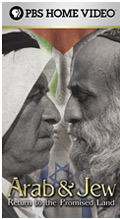 In 1988, documentary filmmaker Robert Gardner visited the Middle East to personally explore one of the most contentious political rivalries of all time, and the result was the acclaimed PBS report Arab and Jew: Wounded Spirits in a Promised Land. Over a decade later, Gardner returned to Israel and the West Bank and once again lets both Israelis and Palestinians speak for themselves as they discuss the issues that separate them (such as Jewish settlements in the West Bank, the right to return, and possession of Jerusalem), how their views have changed in the wake of the Oslo peace negotiations, and how much still remains the same.
In 1988, documentary filmmaker Robert Gardner visited the Middle East to personally explore one of the most contentious political rivalries of all time, and the result was the acclaimed PBS report Arab and Jew: Wounded Spirits in a Promised Land. Over a decade later, Gardner returned to Israel and the West Bank and once again lets both Israelis and Palestinians speak for themselves as they discuss the issues that separate them (such as Jewish settlements in the West Bank, the right to return, and possession of Jerusalem), how their views have changed in the wake of the Oslo peace negotiations, and how much still remains the same.In a well balanced, unbiased presentation, neither anti-Jew nor anti-Arab, Robert Gardner unfolds reasons, reality, and passion on both sides of the issue of ownership and preservation. This preservation of existence disseminates a lack of compassion on all sides, the uncontrollable tensions, and the ultimate feud.
The film describes a land given by God to the Jewish people (the Promised Land) versus a land occupied by Arab people, since the 7th century (thousands of years). With ten years past since the original documentary, not a lot of change has occurred. A strong connection still exists with the land on both sides. Is the land Zion or Palestine? One individual from Palestine expressed, "Return to our land by Palestine is not a fantasy, but a solemn promise." On the other hand, the Jewish people suffering from the mass destruction memory of the holocaust, occupy and protect their promise and stake in the land.
Below is a short bulleted list of a few issues from the documentary film with a potential correlation to the heated disagreement between Arabs and Jews:
- At one time, the three sons, Jewish, Muslim, and Christian lived peacefully together. Has there really ever been peace in the Middle East? Did the European Jews moving back to the Holy Land after the holocast experience, break the harmony of the land? Are the three cultures too different to co-exist or did fear drive the separation.
- Ziad Abbas says, "Why is someone coming to take my land?" Palestinians were forced out of their family homes and Jewish settlers took over their land and homes, a land previously owned by the Jews. However, imagine a land with generations of your family buried in it, being taken over and you now have no access to it.
- One individual expressed, "Equality equals throwing no one into the sea!"
- Occupation and control of everything is the number one issue according to an interviewed Arab. Arab hopes are broken. This brokenness causes desperation and desperate people are very dangerous.
- Humiliation is a grinding point that enrages Arabs. The young and old alike are all treated as terrorists. This racial profiling drives people crazy. Most Arabs and Jews, even neighbors, do not speak. Talking is very important in understanding others!
- Segregation exists, "Apartment for sale, Jews only." The unspoken rule is live together, but in your own place. Some Arabs ask, "Are we a cancer in your midst?" What is a major and a minor citizen?
- One Israeli Mother said, "Once you succumb to bullet proof vests and helmets, you have lost your freedom."
- In the Arab and Jew relationship everything is black and white, there is no room for shades of grey.
- Arab and Jews are imprisoned by history. Both sides are blinded to injustice today, but have 20/20 vision to 3 thousand years ago.
- Lastly, one individual described the relationship of Arab and Jew to a divorce. It is all over, but the body count. Unfortunately, this is an expression of, "It will never change."


No comments:
Post a Comment